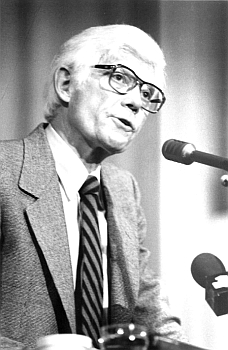 Gerald Ford said of John Bayard Anderson, “He’s the smartest guy in Congress, but he insists on voting his conscience instead of party.” This statement spoke well of the son on a Swedish immigrant who sought to honor his beliefs. Anderson, from Rockford, Illinois (Illinois’ 16th Congressional district) served in the U. S. House of Representatives for twenty years (ten terms) and was a candidate for president in the 1980 election.
Gerald Ford said of John Bayard Anderson, “He’s the smartest guy in Congress, but he insists on voting his conscience instead of party.” This statement spoke well of the son on a Swedish immigrant who sought to honor his beliefs. Anderson, from Rockford, Illinois (Illinois’ 16th Congressional district) served in the U. S. House of Representatives for twenty years (ten terms) and was a candidate for president in the 1980 election.
Born in 1922, Anderson was the recipient of an honorary doctorate from Wheaton (LL.D. — Doctor of Laws) in 1970 and spoke at Wheaton on occasion. Though honored in 1970, his visit on March 12, 1980 was not so hospitable. The election season of 1980 was the most significant season of political stops Wheaton College had ever seen. Illinois has, for a long time, been a key battleground state with its large numbers of electoral votes and the 1980 primary season brought many March visitors to the campus. The first visitor was John B. Anderson.
A devout Christian, as a member of Congress Anderson, on three occasions, sought to amend the U.S. Constitution to recognize the law and authority of Jesus Christ over the United States. This put him in good stead with conservative Christian voters, but during his race for the presidential nomination he supported certain abortion rights. His endorsement of a person’s right to choose, which he believed was God-given, put him at odds with the same conservatives that once heralded his work in Washington. It is amazing to see what difference a decade can make. Having served in Congress for nearly two decades Anderson retained his economic conservatism but grew much more moderate in his position on social issues. He and his fellow Republicans of similar moderate beliefs had become known as Rockefeller Republicans. Anderson’s wife noted that after the murder of Martin Luther King Jr. and the 1968 riots she understood her husband’s devotion to his work. Though shaken by the events of that year she found she couldn’t match his level of concern.
Anderson’s reception at the November polls were about as favorable as he had received at Wheaton. In the end he received 7% of the popular vote and didn’t carry a single precinct, not even in Rockford, Illinois. Unable to return to his seat in Congress Anderson found himself as a visiting professor on several college and university campuses. Unfortunately, Wheaton College was not one of them.
The Wesley Pippert Papers document a portion of the Anderson campaign, including audio of several of his campaign speeches.